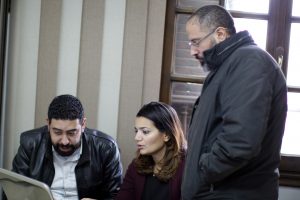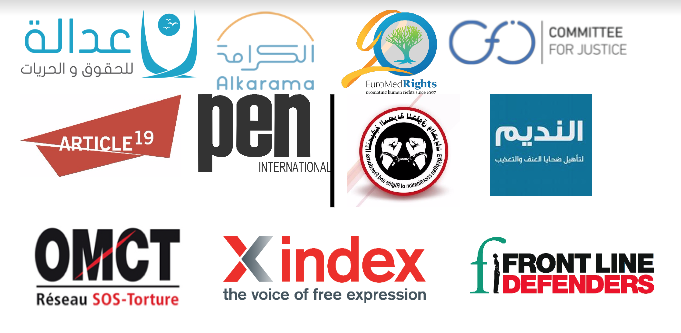ECRF: Fighting for life and freedom in Egypt (New Internationalist, 20 April 2018)
Alessio Perrone meets the activists shining light on human rights abuses during Egypt’s dark days. Read the full article
Alessio Perrone meets the activists shining light on human rights abuses during Egypt’s dark days. Read the full article
[vc_row][vc_column][vc_column_text]Doughty Street International’s Media Defence Panel invites you to join a breakfast seminar on freedom of expression and the protection of journalists and human rights activists in Egypt. Hosted in association with Index on Censorship, we will be joined by a representative of the Egyptian Commission for Rights and Freedoms, Egypt (ECRF), nominees for this year’s Index on Censorship Freedom of Expression Award for Campaigning.
ECRF is one of the few human rights organisations still operating in Egypt. It provides advocacy, legal support and campaigning expertise to draw attention to human rights abuses taking place under the rule of President Abdel Fattah-el-Sisi. ECRF plays an important role in documenting cases of enforced disappearance and arrests during protests, which are not reported in the heavily censored local media, and in providing legal help for the families of those detained and disappeared. Twice last year ECRF’s headquarters was raided by security forces and two staff members were arrested.
ECRF says: “Our main goal to achieve in the future, which is stated in our mission, is to empower individuals to acquire their rights, promote a culture of democracy in the Egyptian society, and expand human rights to every home in Egypt.”
The seminar will involve a panel and roundtable discussion, including a representative of ECRF; Jodie Ginsberg, Index on Censorship; and Jeremy Dear, Deputy General Secretary of the International Federation of Journalists.[/vc_column_text][vc_row_inner][vc_column_inner width=”1/3″][vc_single_image image=”74586″ img_size=”full” alignment=”center”][/vc_column_inner][vc_column_inner width=”1/3″][vc_single_image image=”99393″ alignment=”center”][/vc_column_inner][vc_column_inner width=”1/3″][vc_single_image image=”97988″][/vc_column_inner][/vc_row_inner][/vc_column][/vc_row][vc_row][vc_column][vc_column_text]
[/vc_column_text][/vc_column][/vc_row]
[vc_row][vc_column][vc_video link=”https://youtu.be/7kseuuaARZQ”][vc_column_text]The Egyptian Commission for Rights and Freedoms (ECRF) is one of the only human rights organisations still operating in a country increasingly hostile to dissent and in which countless civil society organisations have been forced to close. The commission coordinates campaigns for those who have been tortured or disappeared, as well as highlighting numerous incidences of human rights abuses.
“Our main goal to achieve in the future, which is stated in our mission, is to empower individuals to acquire their rights, promote a culture of democracy in the Egyptian society, and expand human rights to every home in Egypt,” ECRF told Index. “But in the end of the day we decide to carry out with our work regardless of the challenges because if everyone is silenced this would be the ultimate gain to the current regime, and the ultimate victory to Egypt’s state of fear.”
Between August 2016 and August 2017, the ECRF documented 378 cases of enforced disappearance many of whom were students. The cases of the disappeared are not reported in the heavily censored local media, and the commission’s website and social media sites are some of the few places their plight can be publicised, reported and mapped.
The highly restrictive and repressive environment Egypt has made it increasingly difficult for the organisation to do its work.
Their website was blocked in September in government measures designed to close the organisation down, but the ECRF managed to create a parallel website to maintain their presence and engagement with the public. Twice last year ECRF’s headquarters was raided by security forces with two staff members being arrested. As a result, the staff need help dealing with the risks of being arrested, as well as dealing with the interrogation process and knowing how to protect information.
Over the past 12 months the ECRF has been fighting censorship and defending human rights in two ways. The first is through the criminal justice programme which tackles issues of torture and enforced disappearances in Egypt. It has been particularly focused on the arrest of activists who took part in demonstrations against Egypt’s agreement to cede two uninhabited islands in the Red Sea to Saudi Arabia.

Secondly, ECRF has worked on challenging censorship imposed on student associations in universities. Recently the commission launched an online platform to bring students and practitioners online to discuss a student charter related to freedom of association in universities. The platform was heavily criticised by the ministry of higher education in Cairo, which led to further condemnation of it in official media outlets.
As a direct result of the work ECRF has carried out over the past year, there has been an increased awareness of enforced disappearances, media censorship, the scale of torture, and violations of freedom of association and expression in media and universities.
“ECRF is honored to be shortlisted alongside three peer organizations/campaigns also facing severe human rights challenges in their own countries,” said ECRF. “The international recognition of ECRF’s efforts in campaigning for fundamental freedoms emboldens its members and staff in their resilience to strive for human rights and democracy in Egypt. Regardless of the winner, progress towards equal rights in Russia means progress in Egypt and progress in Kenya means progress in Iran and vice-versa.”
See the full shortlist for Index on Censorship’s Freedom of Expression Awards 2018 here.[/vc_column_text][/vc_column][/vc_row][vc_row full_width=”stretch_row_content” equal_height=”yes” el_class=”text_white” css=”.vc_custom_1490258749071{background-color: #cb3000 !important;}”][vc_column width=”1/2″][vc_custom_heading text=”Support the Index Fellowship.” font_container=”tag:p|font_size:28|text_align:center” use_theme_fonts=”yes” link=”url:https%3A%2F%2Fwww.indexoncensorship.org%2Fsupport-the-freedom-of-expression-awards%2F|||”][vc_column_text]
By donating to the Freedom of Expression Awards you help us support
individuals and groups at the forefront of tackling censorship.
[/vc_column_text][/vc_column][vc_column width=”1/2″ css=”.vc_custom_1521479845471{background-image: url(https://www.indexoncensorship.org/wp-content/uploads/2017/05/2017-awards-fellows-1460×490-2_revised.jpg?id=90090) !important;background-position: center !important;background-repeat: no-repeat !important;background-size: cover !important;}”][/vc_column][/vc_row][vc_row][vc_column][vc_basic_grid post_type=”post” max_items=”4″ element_width=”6″ grid_id=”vc_gid:1522065946315-a2955265-bb40-3″ taxonomies=”10735″][/vc_column][/vc_row]

To: His Excellency Zeid Ra’ad Al Hussein, United Nations High Commissioner for Human Rights
Re: Call for action to condemn the Egyptian authorities’ crackdown on freedom of expression
Mr High Commissioner,
We, the undersigned organisations, are writing to express our great concern about the current human rights situation in Egypt.
Four years ago today, Egypt’s anti-protest law was signed, restricting the right to free assembly to such an extent that the mere planning of a demonstration has been criminalised.
This law remains one element of a repressive legislative arsenal denying Egyptian citizens their rights to freedom of opinion, expression, association, and peaceful assembly, under the pretext of maintaining stability and countering terrorism.
The Media and Press Law of 26 December 2016 constitutes an unprecedented attack on press freedom, the NGO Law has made it impossible for civil society to operate safely, while the Anti-Terrorism Law has been used to impose travel bans and asset freezes on journalists, human rights defenders and other peaceful activists.
These laws act as powerful tools in the hands of the security forces, which carry out the most severe violations of human rights on a daily basis, and in a climate of impunity: summary executions, abductions followed by secret detentions and enforced disappearances, torture, rape, arbitrary arrests, unfair trials before civilian and military courts leading to heavy prison sentences, including the death penalty.
The authorities have been resorting to these severe violations in a systematic fashion in order to instil fear within society and to silence any form of dissent by discouraging individuals from speaking out. Those targeted include students, professors, trade unionists, journalists, lawyers, human rights defenders, political opponents and other peaceful activists.
In addition to these attacks against the liberty and physical integrity of its citizens, the Egyptian authorities have imposed widespread online censorship and surveillance. Since May 2017, more than 400 websites – including those of news outlets and human rights organisations – have been blocked in an attempt to suppress reports which contradict the state narrative on the human rights situation in the country.
We believe this repressive apparatus, established under the pretext of ensuring stability, is not only counter-productive, but its very existence permits abuses that go against the human rights principles enshrined in the Universal Declaration of Human Rights (UDHR) and the International Covenant on Civil and Political Rights, the latter of which Egypt has been party to since 1982.
Mr High Commissioner, as we near the 70th anniversary of the UDHR, the Egyptian authorities must be reminded of their commitment to ensure “freedom of speech and belief and freedom from fear and want”. Such freedoms have been qualified as the “highest aspiration of the common people” by the UDHR. The Egyptian people are no exception, and they deserve your strongest support and attention.
Mr High Commissioner, your mandate gives you the authority to engage in a dialogue with all governments to secure respect for all human rights. We believe your support is crucial to ensure that the people of Egypt enjoy “the equal and inalienable rights of all members of the human family” proclaimed 70 years ago.
Given the extreme gravity of these human rights abuses, we urge you to publicly and strongly condemn these violations of the rights to freedom of opinion, expression, association and peaceful assembly, as well as the attacks on the liberty and integrity of Egyptian citizens. We kindly request that you call upon the authorities to put an end to these violations and establish the necessary prevention and accountability mechanisms to avoid their repetition.
The undersigned organisations:
Adalah Center for Rights & Freedoms
Alkarama Foundation
ARTICLE 19
Committee for Justice
Egyptian Coordination of Rights and Freedoms
El Nadim Center against Torture and Violence
EuroMed Rights
Front Line Defenders
Index on Censorship
PEN International
World Organisation Against Torture (OMCT)